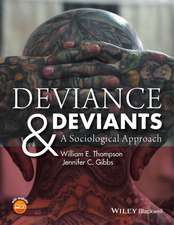Integrated Developmental and Life-course Theories of Offending: Advances in Criminological Theory
Editat de David P. Farringtonen Limba Engleză Paperback – 30 iun 2008
| Toate formatele și edițiile | Preț | Express |
|---|---|---|
| Paperback (1) | 432.29 lei 43-57 zile | |
| Taylor & Francis – 30 iun 2008 | 432.29 lei 43-57 zile | |
| Hardback (1) | 1000.27 lei 43-57 zile | |
| Taylor & Francis – 6 oct 2017 | 1000.27 lei 43-57 zile |
Din seria Advances in Criminological Theory
-
 Preț: 327.48 lei
Preț: 327.48 lei -
 Preț: 337.22 lei
Preț: 337.22 lei -
 Preț: 389.38 lei
Preț: 389.38 lei -
 Preț: 416.82 lei
Preț: 416.82 lei -
 Preț: 395.04 lei
Preț: 395.04 lei -
 Preț: 489.26 lei
Preț: 489.26 lei - 14%
 Preț: 299.52 lei
Preț: 299.52 lei - 15%
 Preț: 297.57 lei
Preț: 297.57 lei -
 Preț: 375.54 lei
Preț: 375.54 lei -
 Preț: 391.22 lei
Preț: 391.22 lei - 13%
 Preț: 351.24 lei
Preț: 351.24 lei -
 Preț: 349.10 lei
Preț: 349.10 lei -
 Preț: 416.22 lei
Preț: 416.22 lei -
 Preț: 449.63 lei
Preț: 449.63 lei -
 Preț: 393.52 lei
Preț: 393.52 lei -
 Preț: 444.80 lei
Preț: 444.80 lei - 18%
 Preț: 999.51 lei
Preț: 999.51 lei - 16%
 Preț: 260.54 lei
Preț: 260.54 lei - 16%
 Preț: 262.73 lei
Preț: 262.73 lei -
 Preț: 342.70 lei
Preț: 342.70 lei - 14%
 Preț: 299.52 lei
Preț: 299.52 lei -
 Preț: 441.91 lei
Preț: 441.91 lei -
 Preț: 395.37 lei
Preț: 395.37 lei -
 Preț: 426.46 lei
Preț: 426.46 lei -
 Preț: 353.62 lei
Preț: 353.62 lei -
 Preț: 389.66 lei
Preț: 389.66 lei - 30%
 Preț: 769.59 lei
Preț: 769.59 lei
Preț: 432.29 lei
Nou
Puncte Express: 648
Preț estimativ în valută:
82.73€ • 86.05$ • 68.30£
82.73€ • 86.05$ • 68.30£
Carte tipărită la comandă
Livrare economică 14-28 aprilie
Preluare comenzi: 021 569.72.76
Specificații
ISBN-13: 9781412807999
ISBN-10: 1412807999
Pagini: 280
Dimensiuni: 152 x 229 x 15 mm
Greutate: 0.36 kg
Ediția:1
Editura: Taylor & Francis
Colecția Routledge
Seria Advances in Criminological Theory
Locul publicării:Oxford, United Kingdom
ISBN-10: 1412807999
Pagini: 280
Dimensiuni: 152 x 229 x 15 mm
Greutate: 0.36 kg
Ediția:1
Editura: Taylor & Francis
Colecția Routledge
Seria Advances in Criminological Theory
Locul publicării:Oxford, United Kingdom
Cuprins
1: Introduction to Integrated Developmental and Life-Course Theories of Offending; 2: A Developmental Model of the Propensity to Offend during Childhood and Adolescence *; 3: Explaining the Facts of Crime: How the Developmental Taxonomy Replies to Farrington’s Invitation; 4: The Integrated Cognitive Antisocial Potential (ICAP) Theory; 5: Mediating the Effects of Poverty, Gender, Individual Characteristics, and External Constraints on Antisocial Behavior: A Test of the Social Development Model and Implications for Developmental Life-Course Theory *; 6: An Integrative Personal Control Theory of Deviant Behavior: Answers to Contemporary Empirical and Theoretical Developmental Criminology Issues 1 , 2; 7: A General Age-Graded Theory of Crime: Lessons Learned and the Future of Life-Course Criminology; 8: Applying Interactional Theory to the Explanation of Continuity and Change in Antisocial Behavior *; 9: The Social Origins of Pathways in Crime: Towards a Developmental Ecological Action Theory of Crime Involvement and Its Changes; 10: Conclusions about Developmental and Life-Course Theories
Descriere
Developmental and life-course criminology aims to provide information about how offending and antisocial behavior develops, about risk and protective factors at different ages, and about the effects of life events on the course of development











